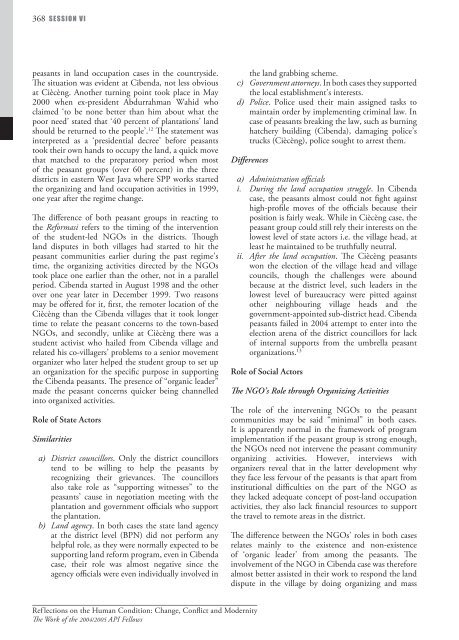Reflections on the Human Condition - Api-fellowships.org
Reflections on the Human Condition - Api-fellowships.org
Reflections on the Human Condition - Api-fellowships.org
You also want an ePaper? Increase the reach of your titles
YUMPU automatically turns print PDFs into web optimized ePapers that Google loves.
368 SESSION VI<br />
peasants in land occupati<strong>on</strong> cases in <strong>the</strong> countryside.<br />
The situati<strong>on</strong> was evident at Cibenda, not less obvious<br />
at Ciècèng. Ano<strong>the</strong>r turning point took place in May<br />
2000 when ex-president Abdurrahman Wahid who<br />
claimed ‘to be n<strong>on</strong>e better than him about what <strong>the</strong><br />
poor need’ stated that ‘40 percent of plantati<strong>on</strong>s’ land<br />
should be returned to <strong>the</strong> people’. 12 The statement was<br />
interpreted as a ‘presidential decree’ before peasants<br />
took <strong>the</strong>ir own hands to occupy <strong>the</strong> land, a quick move<br />
that matched to <strong>the</strong> preparatory period when most<br />
of <strong>the</strong> peasant groups (over 60 percent) in <strong>the</strong> three<br />
districts in eastern West Java where SPP works started<br />
<strong>the</strong> <strong>org</strong>anizing and land occupati<strong>on</strong> activities in 1999,<br />
<strong>on</strong>e year after <strong>the</strong> regime change.<br />
The difference of both peasant groups in reacting to<br />
<strong>the</strong> Reformasi refers to <strong>the</strong> timing of <strong>the</strong> interventi<strong>on</strong><br />
of <strong>the</strong> student-led NGOs in <strong>the</strong> districts. Though<br />
land disputes in both villages had started to hit <strong>the</strong><br />
peasant communities earlier during <strong>the</strong> past regime’s<br />
time, <strong>the</strong> <strong>org</strong>anizing activities directed by <strong>the</strong> NGOs<br />
took place <strong>on</strong>e earlier than <strong>the</strong> o<strong>the</strong>r, not in a parallel<br />
period. Cibenda started in August 1998 and <strong>the</strong> o<strong>the</strong>r<br />
over <strong>on</strong>e year later in December 1999. Two reas<strong>on</strong>s<br />
may be offered for it, first, <strong>the</strong> remoter locati<strong>on</strong> of <strong>the</strong><br />
Ciècèng than <strong>the</strong> Cibenda villages that it took l<strong>on</strong>ger<br />
time to relate <strong>the</strong> peasant c<strong>on</strong>cerns to <strong>the</strong> town-based<br />
NGOs, and sec<strong>on</strong>dly, unlike at Ciècèng <strong>the</strong>re was a<br />
student activist who hailed from Cibenda village and<br />
related his co-villagers’ problems to a senior movement<br />
<strong>org</strong>anizer who later helped <strong>the</strong> student group to set up<br />
an <strong>org</strong>anizati<strong>on</strong> for <strong>the</strong> specific purpose in supporting<br />
<strong>the</strong> Cibenda peasants. The presence of “<strong>org</strong>anic leader”<br />
made <strong>the</strong> peasant c<strong>on</strong>cerns quicker being channelled<br />
into <strong>org</strong>anixed activities.<br />
Role of State Actors<br />
Similarities<br />
a) District councillors.<br />
Only <strong>the</strong> district councillors<br />
tend to be willing to help <strong>the</strong> peasants by<br />
recognizing <strong>the</strong>ir grievances. The councillors<br />
also take role as “supporting witnesses” to <strong>the</strong><br />
peasants’ cause in negotiati<strong>on</strong> meeting with <strong>the</strong><br />
plantati<strong>on</strong> and government officials who support<br />
<strong>the</strong> plantati<strong>on</strong>.<br />
b) Land agency.<br />
In both cases <strong>the</strong> state land agency<br />
at <strong>the</strong> district level (BPN) did not perform any<br />
helpful role, as <strong>the</strong>y were normally expected to be<br />
supporting land reform program, even in Cibenda<br />
case, <strong>the</strong>ir role was almost negative since <strong>the</strong><br />
agency officials were even individually involved in<br />
Ref lecti<strong>on</strong>s <strong>on</strong> <strong>the</strong> <strong>Human</strong> C<strong>on</strong>diti<strong>on</strong>: Change, C<strong>on</strong>flict and Modernity<br />
The Work of <strong>the</strong> 2004/2005 API Fellows<br />
<strong>the</strong> land grabbing scheme.<br />
c) Government attorneys.<br />
In both cases <strong>the</strong>y supported<br />
<strong>the</strong> local establishment’s interests.<br />
d) Police.<br />
Police used <strong>the</strong>ir main assigned tasks to<br />
maintain order by implementing criminal law. In<br />
case of peasants breaking <strong>the</strong> law, such as burning<br />
hatchery building (Cibenda), damaging police’s<br />
trucks (Ciècèng), police sought to arrest <strong>the</strong>m.<br />
Differences<br />
a) Administrati<strong>on</strong> officials<br />
i. During <strong>the</strong> land occupati<strong>on</strong> struggle.<br />
In Cibenda<br />
case, <strong>the</strong> peasants almost could not fight against<br />
high-profile moves of <strong>the</strong> officials because <strong>the</strong>ir<br />
positi<strong>on</strong> is fairly weak. While in Ciècèng case, <strong>the</strong><br />
peasant group could still rely <strong>the</strong>ir interests <strong>on</strong> <strong>the</strong><br />
lowest level of state actors i.e. <strong>the</strong> village head, at<br />
least he maintained to be truthfully neutral.<br />
ii. After <strong>the</strong> land occupati<strong>on</strong>.<br />
The Ciècèng peasants<br />
w<strong>on</strong> <strong>the</strong> electi<strong>on</strong> of <strong>the</strong> village head and village<br />
councils, though <strong>the</strong> challenges were abound<br />
because at <strong>the</strong> district level, such leaders in <strong>the</strong><br />
lowest level of bureaucracy were pitted against<br />
o<strong>the</strong>r neighbouring village heads and <strong>the</strong><br />
government-appointed sub-district head. Cibenda<br />
peasants failed in 2004 attempt to enter into <strong>the</strong><br />
electi<strong>on</strong> arena of <strong>the</strong> district councillors for lack<br />
of internal supports from <strong>the</strong> umbrella peasant<br />
<strong>org</strong>anizati<strong>on</strong>s. 13<br />
Role of Social Actors<br />
The NGO’s Role through Organizing Activities<br />
The role of <strong>the</strong> intervening NGOs to <strong>the</strong> peasant<br />
communities may be said “minimal” in both cases.<br />
It is apparently normal in <strong>the</strong> framework of program<br />
implementati<strong>on</strong> if <strong>the</strong> peasant group is str<strong>on</strong>g enough,<br />
<strong>the</strong> NGOs need not intervene <strong>the</strong> peasant community<br />
<strong>org</strong>anizing activities. However, interviews with<br />
<strong>org</strong>anizers reveal that in <strong>the</strong> latter development why<br />
<strong>the</strong>y face less fervour of <strong>the</strong> peasants is that apart from<br />
instituti<strong>on</strong>al difficulties <strong>on</strong> <strong>the</strong> part of <strong>the</strong> NGO as<br />
<strong>the</strong>y lacked adequate c<strong>on</strong>cept of post-land occupati<strong>on</strong><br />
activities, <strong>the</strong>y also lack financial resources to support<br />
<strong>the</strong> travel to remote areas in <strong>the</strong> district.<br />
The difference between <strong>the</strong> NGOs’ roles in both cases<br />
relates mainly to <strong>the</strong> existence and n<strong>on</strong>-existence<br />
of ‘<strong>org</strong>anic leader’ from am<strong>on</strong>g <strong>the</strong> peasants. The<br />
involvement of <strong>the</strong> NGO in Cibenda case was <strong>the</strong>refore<br />
almost better assisted in <strong>the</strong>ir work to resp<strong>on</strong>d <strong>the</strong> land<br />
dispute in <strong>the</strong> village by doing <strong>org</strong>anizing and mass

















